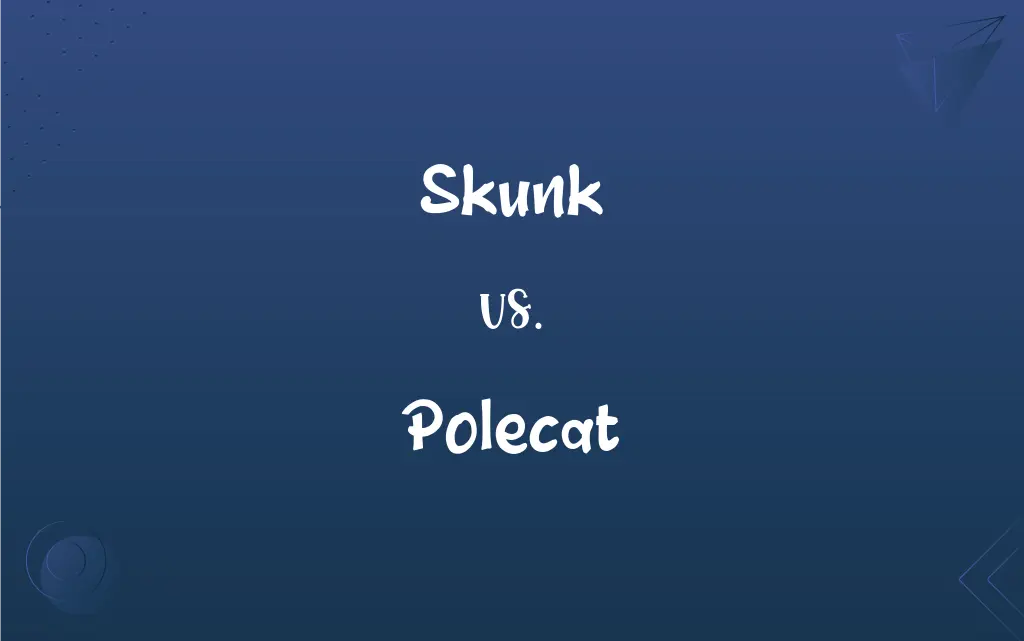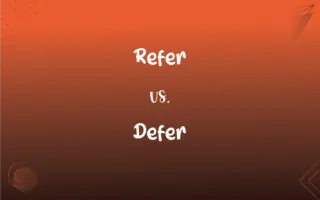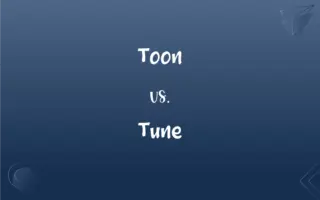Skunk vs. Polecat: What's the Difference?
Edited by Aimie Carlson || By Janet White || Updated on October 11, 2023
Skunks are North American mammals known for their distinctive black and white coloration and potent spray. Polecats are European mustelids, closely related to weasels and ferrets, with a musky odor.

Key Differences
Skunks are iconic animals native primarily to the Americas, particularly North America. They are recognized for their black and white striped or spotted fur. Polecats, on the other hand, hail from Europe and parts of Asia. While they share a semblance in body shape, they lack the striking coloration of skunks.
Skunks are infamous for their unique defense mechanism: a pungent spray that they can shoot at potential threats. This spray contains chemicals that are difficult to wash off and can cause temporary blindness. Polecats do have a strong musky smell, especially when threatened, but they don’t have the ability to spray adversaries like skunks do.
Skunks belong to the Mephitidae family, which sets them apart from other similar-looking animals. The European polecat, a member of the Mustelidae family, is a relative to ferrets and weasels. While both skunks and polecats are carnivorous and nocturnal, they have evolved differently due to their differing habitats.
Skunks, especially the striped skunk, have become a part of popular culture in North America. Their distinct appearance and odoriferous reputation make them easily identifiable. Polecats, while less famous on the global stage, play a vital role in the folklore and ecosystems of Europe and Asia.
Skunks and polecats, despite similarities in size and general shape, are distinct creatures. Their behaviors, habitats, defense mechanisms, and roles in their respective ecosystems demonstrate the divergence of these two mammals.
ADVERTISEMENT
Comparison Chart
Origin
North America
Europe and parts of Asia
Family
Mephitidae
Mustelidae
Defensive Mechanism
Sprays a pungent odor
Releases a musky smell
Coloration
Black and white
Brown or dark in color
Relation to Culture
Popular in North American culture
Important in European folklore
ADVERTISEMENT
Skunk and Polecat Definitions
Skunk
A black and white North American mammal known for its foul-smelling spray.
The skunk sprayed its odor when it felt threatened by the dog.
Polecat
A European mammal closely related to weasels with a musky odor.
The polecat was seen foraging in the woods at dusk.
Skunk
A slang term for a contemptible person.
He acted like such a skunk at the party.
Polecat
A person regarded as disagreeable or malicious.
Don't be such a polecat; help out your neighbor.
Skunk
A defect or failure.
The product was a skunk and had to be recalled.
Polecat
A slang term for something that smells foul.
Take out the trash; it smells like a polecat!
Skunk
Any of several small omnivorous mammals of the Americas belonging to the family Mephitidae, having a bushy tail and black fur with white markings and ejecting a foul-smelling oily liquid from glands near the anus when threatened.Also called polecat.
Polecat
An archaic term for a prostitute or disreputable woman.
In the old play, she was cast as the polecat.
Skunk
The glossy black and white fur of any of these mammals.
Polecat
A colloquial term for a skunk in some parts of the U.S.
I thought I saw a polecat, but it was just a regular skunk.
Skunk
(Slang)A person regarded as obnoxious or despicable.
Polecat
A chiefly nocturnal mustelid mammal (Mustela putorius) of Europe that ejects a malodorous fluid to mark its territory and defend itself from predators. Also called fitch.
Skunk
(Slang)Marijuana.
Polecat
Either of two similar mammals, Mustela eversmanii of the Central Asian steppes, having a light brown coat with a black mask, or Vormela peregusna of Eurasia, having a mottled yellow and brown coat.
Skunk
To spray with the foul-smelling liquid of a skunk:The dog got skunked.
Polecat
See skunk.
Skunk
To defeat overwhelmingly, especially by keeping from scoring.
Polecat
A weasel-like animal of the genus Mustela.
Skunk
To cause to have no success trying to catch fish. Used in the passive.
Polecat
Notably, the European polecat, Mustela putorius.
Skunk
To cheat (someone).
Polecat
A skunk.
Skunk
To fail to pay (an amount due).
Polecat
(television) A tubular device used to support lights on a set.
Skunk
Any of various small mammals, of the family Mephitidae, native to North and Central America, having a glossy black with a white coat and two musk glands at the base of the tail for emitting a noxious smell as a defensive measure.
Polecat
A small European carnivore of the Weasel family (Putorius fœtidus). Its scent glands secrete a substance of an exceedingly disagreeable odor. Called also fitchet, foulmart, and European ferret.
Skunk
A despicable person.
Polecat
American musteline mammal typically ejecting an intensely malodorous fluid when startled; in some classifications put in a separate subfamily Mephitinae
Skunk
Anything very bad; a stinker.
Polecat
Dark brown mustelid of woodlands of Eurasia that gives off an unpleasant odor when threatened
Skunk
(slang) A walkover victory in sports or board games, as when the opposing side is unable to score.
Skunk
(cribbage) A win by 30 or more points. (A double skunk is 60 or more, a triple skunk 90 or more.)
Skunk
A member of a hybrid skinhead and punk subculture.
Skunk
(slang) skunkweed.
Skunk
Any of the strains of hybrids of Cannabis sativa and Cannabis indica that may have THC levels exceeding those of typical hashish.
Skunk
To defeat so badly as to prevent any opposing points.
I skunked him at cards.
We fished all day but the lake skunked us.
Skunk
(cribbage) To win by 30 or more points.
Skunk
To go bad, to spoil.
Skunk
Any one of several species of American musteline carnivores of the genus Mephitis and allied genera. They have two glands near the anus, secreting an extremely fetid liquid, which the animal ejects at pleasure as a means of defense.
Skunk
In games of chance and skill: To defeat (an opponent) (as in cards) so that he fails to gain a point, or (in checkers) to get a king.
Skunk
A person who is deemed to be despicable or contemptible;
Only a rotter would do that
Kill the rat
Throw the bum out
You cowardly little pukes!
The British call a contemptible person a `git'
Skunk
A defeat in a game where one side fails to score
Skunk
Street names for marijuana
Skunk
American musteline mammal typically ejecting an intensely malodorous fluid when startled; in some classifications put in a separate subfamily Mephitinae
Skunk
Defeat by a lurch
Skunk
To defeat someone thoroughly in a game.
We skunked the other team 10-0.
Skunk
A strain of cannabis known for its strong smell.
That skunk strain has a potent aroma.
FAQs
What do polecats eat?
Polecats are carnivores and eat small mammals, birds, and amphibians.
How can you differentiate a skunk from a polecat by color?
Skunks typically have distinctive black and white patterns, while polecats are brown or dark.
Where are skunks native to?
Skunks are primarily native to the Americas.
Do polecats spray like skunks?
No, polecats release a musky odor but don't spray like skunks.
Which family do skunks belong to?
Skunks belong to the Mephitidae family.
Are polecats and skunks the same?
No, polecats are European mustelids, while skunks are North American mammals.
Do skunks spray when threatened?
Yes, skunks release a pungent spray as a defense mechanism.
Can you keep a skunk as a pet?
In some U.S. states, with proper permits, skunks can be kept as pets after their scent glands are removed.
Is the polecat related to the ferret?
Yes, the European polecat is a close relative of the domestic ferret.
Why do skunks have stripes?
The black and white stripes serve as a warning to predators about their defensive spray.
Are polecats endangered?
Some species or subspecies of polecat may be threatened, but the European polecat is not currently endangered.
What does the term "polecat" mean in American slang?
In some parts of the U.S., "polecat" can colloquially refer to a skunk.
What's the lifespan of a polecat in the wild?
Polecats typically live around 5-7 years in the wild.
Are there different species of skunks?
Yes, there are several species, including the striped, spotted, hooded, and stink badgers.
What is the habitat of a polecat?
Polecats prefer woodlands, grasslands, and farmlands in Europe and parts of Asia.
How can one get rid of the smell of skunk spray?
A mixture of hydrogen peroxide, baking soda, and dish soap can help neutralize skunk odor.
Where did the name "polecat" originate?
It comes from the French "poule chat," meaning "chicken cat," due to their habit of hunting chickens.
Are skunks and polecats nocturnal?
Yes, both animals are primarily nocturnal, being most active during the night.
Can you remove the scent gland of a skunk?
Yes, it's possible and is often done when skunks are kept as pets.
Do skunks hibernate in winter?
Skunks don't truly hibernate but go into a state of torpor and can be less active.
About Author
Written by
Janet WhiteJanet White has been an esteemed writer and blogger for Difference Wiki. Holding a Master's degree in Science and Medical Journalism from the prestigious Boston University, she has consistently demonstrated her expertise and passion for her field. When she's not immersed in her work, Janet relishes her time exercising, delving into a good book, and cherishing moments with friends and family.
Edited by
Aimie CarlsonAimie Carlson, holding a master's degree in English literature, is a fervent English language enthusiast. She lends her writing talents to Difference Wiki, a prominent website that specializes in comparisons, offering readers insightful analyses that both captivate and inform.































































